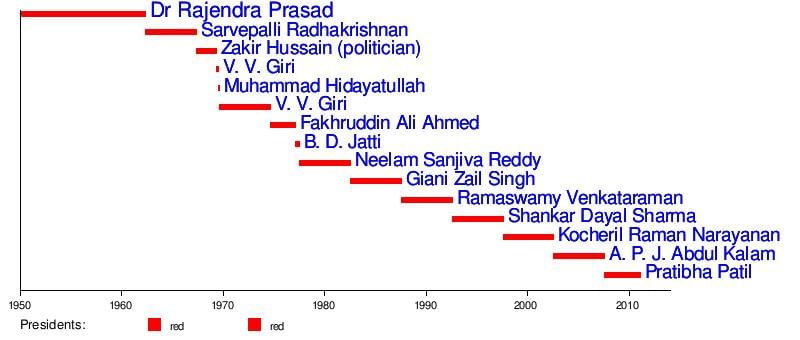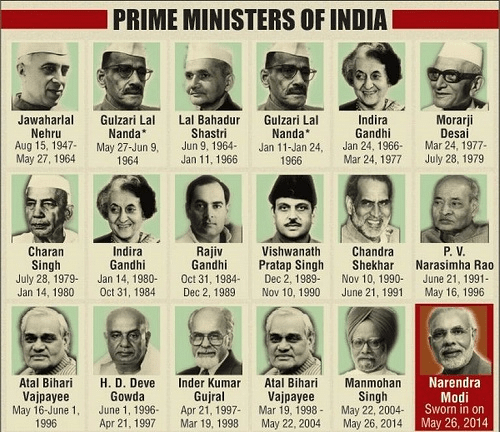Bank Exams Exam > Bank Exams Notes > General Awareness > The President, The Vice-President and the Prime Minister
The President, The Vice-President and the Prime Minister | General Awareness - Bank Exams PDF Download
| Table of contents |

|
| President |

|
| President of India |

|
| Vice – President |

|
| Vice – Presidents of India |

|
| Prime Minister |

|
| Prime Ministers |

|
| of India |

|
| Parliament of India |

|
President

List of our Presidents so far, till Pranab Mukherjee
| 1 | Qualifications |
|
| 2 | Election |
|
| 3 | Term & Emoluments |
|
| 4 | Impeachment |
|
| 5 | Vacancy |
|
| 6 | powers |
|
President
of India
| Sr. No. | Name From To |
| 1 | Dr. Rajendra Prasad 26.01.1950 13.05.1962 |
| 2 | Dr. S. Radhakrishnan 13.05.1962 13.05.1967 |
| 3 | Dr. Zakir Hussain 13.05.1967 03.05.1969 |
| 4 | V. V. Giri (Vice-President) 03.05.1969 20.07.1969 |
| 5 | Justice M. Hidayatullah 20.07.1969 24.08.1969 |
| 6 | V. V. Giri 24.08.1969 24.08.1974 |
| 7 | F. Ali Ahmed 24.08.1974 11.02.1977 |
| 8 | B. D.Jatti 11.02.1977 25.07.1977 |
| 9 | N. Sanjiva Reddy 25.07.1977 25.07.1982 |
| 10 | Gaini Jail Singh 25.07.1982 25.07.1987 |
| 11 | R. Venkataraman 25.07.1987 25.07.1992 |
| 12 | Dr.S.D.Sharma 25.07.1992 25.07.1997 |
| 13 | K.R.Narayanan 25.07.1997 25.07.2002 |
| 14 | Dr.A.P.J.Abdul Kalam 25.07.2002 25.07.2007 |
| 15 | Mrs.Pratibha Patil 25.07.2007 25.07.2012 |
| 16 | Pranab Mukherji 25.07.2012 Till Date |
Vice – President
| 1 | Election | Elected by both (Electoral College) in accordance with the system of proportional representation by means of single transferable vote and the vote being secret. Nominated members also participate in his election. |
| 2 | The Supreme court has the final and exclusive jurisdiction for resolving disputes and doubts relating to the election of the Vice-President. |
| Criteria |
|
| Other Points |
|
Vice – Presidents
of India
| Sr. No. | Name | From | To | Name | From | To |
| 1 | Dr.Sarvepalli Radhakrishnan | 1952 | 1962 | S.Venkataraman | 1984 | 1987 |
| 2 | Dr.Zakir Hussain | 1962 | 1967 | Dr.Shankar Dayal Sharma | 1987 | 1992 |
| 3 | V. V. Giri | 1967 | 1969 | K. R. Narayanan | 1992 | 1977 |
| 4 | Bal Swaroop Pathak | 1969 | 1974 | Krishan Kant | 1997 | 2002 |
| 5 | Dr.M.Jattl | 1974 | 1979 | Bhairon Singh Shekhawat | 2002 | 2007 |
| 6 | Justic Mohd. Hidayatullah | 1979 | 1984 | Hamid Ansari | 2007 | Till date |
Prime Minister

List of our Prime Ministers
| Eligibility |
|
| Powers |
|
Prime Ministers
of India
| Sr. No. | Name | From | To |
| 1 | Jawahar Lal Nehru | 15.08.1947 | 27.05.1964 |
| 2 | Gulzari Lal Nanda | 27.05.1964 | 09.06.1964 |
| 3 | Lal Bahadur Shastri | 09.06.1964 | 11.01.1966 |
| 4 | Gulzari Lal Nanda | 11.01.1966 | 24.01.1966 |
| 5 | Indira Gandhi | 24.01.1966 | 24.03.1977 |
| 6 | Morarji Desai | 24.03.1977 | 28.07.1979 |
| 7 | Charan Singh | 28.07.1979 | 14.01.1980 |
| 8 | Indira Gandhi | 14.01.1980 | 31.10.1984 |
| 9 | Rajiv Gandhi | 31.10.1984 | 01.12.1989 |
| 10 | V. P. Singh | 01.12.1989 | 10.11.1990 |
| 11 | Chandra Shekhar | 10.11.1990 | 21.06.1991 |
| 12 | P. V. Narsimha Rao | 21.06.1991 | 16.05.1996 |
| 13 | Atal Bihari Vajpayee | 16.05.1996 | 01.06.1996 |
| 14 | H. D. Deve Gowda | 01.06.1996 | 21.04.1997 |
| 15 | L. K. Gujral | 21.04.1997 | 19.03.1998 |
| 16 | Atal Bihari Vajpayee | 19.03.1998 | 13.10.1999 |
| 17 | Atal Bihari Vajpayee | 13.10.1999 | 22.05.2004 |
| 18 | Dr. Manmohan Singh | 22.05.2004 | 26.05.2014 |
| 19 | Narendra Modi | 26.05.2014 | Till date |
Parliament of India
| LOK SABHA |
|
The document The President, The Vice-President and the Prime Minister | General Awareness - Bank Exams is a part of the Bank Exams Course General Awareness.
All you need of Bank Exams at this link: Bank Exams
|
365 videos|701 docs|149 tests
|
FAQs on The President, The Vice-President and the Prime Minister - General Awareness - Bank Exams
| 1. Who is the current President of India? |  |
Ans. The current President of India is Ram Nath Kovind.
| 2. How is the President of India elected? |  |
Ans. The President of India is elected indirectly by an Electoral College consisting of the elected members of both houses of Parliament and the elected members of the Legislative Assemblies of the states.
| 3. What are the roles and responsibilities of the Vice-President of India? |  |
Ans. The Vice-President of India serves as the ex-officio Chairman of the Rajya Sabha (the upper house of Parliament) and performs various functions like presiding over the sessions of the Rajya Sabha, maintaining order, interpreting the rules of procedure, and representing the Rajya Sabha in its relations with the President.
| 4. How many Vice-Presidents has India had so far? |  |
Ans. India has had 13 Vice-Presidents since its independence in 1947.
| 5. What is the role of the Prime Minister in India? |  |
Ans. The Prime Minister is the head of government in India and is responsible for leading the executive branch of the government. The Prime Minister is appointed by the President and is the leader of the political party or alliance that has the majority in the Lok Sabha (the lower house of Parliament). The Prime Minister plays a crucial role in policymaking, decision-making, and representing India at the national and international levels.
Related Searches















